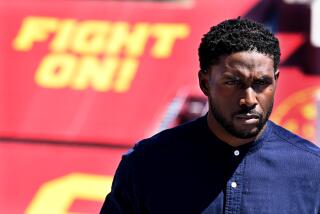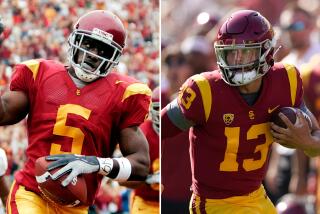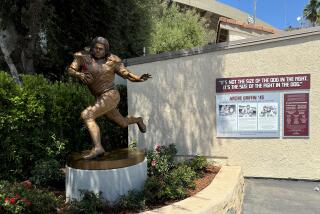Williams Shows He’s Man of His Word
Four years ago, Ricky Williams told the other high school players on his recruiting trips that he was going to win the Heisman Trophy.
Saturday night in New York, he kept his word, walking to the podium at the Downtown Athletic Club to claim a trophy he had won by the fourth-largest margin in history.
UCLA quarterback Cade McNown finished third, behind runner-up Michael Bishop of Kansas State. Kentucky’s Tim Couch was fourth.
Williams, who grew up in San Diego and went on to the University of Texas, emerged as the runaway winner after a season in which he rushed for 2,124 yards and 27 touchdowns and broke Tony Dorsett’s career rushing record as well.
He became the first Heisman winner with dreadlocks and a pierced tongue, but his individuality shined through in other ways.
Williams was modest enough to thank his ailing Pop Warner coach, and respectful enough to remember Doak Walker, the 1948 Heisman winner he had forged a friendship with before Walker’s death this year. He didn’t forget his mother, either.
“On Thanksgiving, I woke up and gave thanks, and just sat there for about an hour and a half,” he said. “I have so much to be thankful for.”
Williams was soft-spoken Saturday, but he’s the same young man who had enough confidence to tell other recruits--high school stars every one of them--exactly what his plans were.
“He said he was going to win two Heismans,” said USC safety Rashard Cook, who visited the USC campus with Williams before Williams chose Texas. “He was almost right. At least he won one.”
Jerry Varner, Williams’ coach at Patrick Henry High in San Diego, laughed at the story.
“That’s Ricky,” Varner said.
Even after Williams was well on his way, he stayed close to his past. In October, on a weekend when Texas didn’t have a game, he returned to San Diego to be the grand marshal for homecoming at Patrick Henry High.
“He talked to the kids on the field before the game, between the goal posts,” Varner said. “We wanted him to wear a tux, but he didn’t want to. He thought that would be too much attention.”
He couldn’t avoid the attention Saturday.
Williams won by a landslide, receiving the highest percentage of first-place ballots in history and besting Bishop by 1,563 points, the fourth-largest margin in history.
Williams received 714 first-place votes and 2,355 points. Bishop had 41 first-place votes and 792 points, McNown had 28 first-place votes and 696 points and Kentucky’s Tim Couch had 527 points.
O.J. Simpson’s 1,750-point margin in 1968 is the largest in history. In 1993, Florida State’s Charlie Ward won by 1,622 points, and in 1991, Michigan’s Desmond Howard won by 1,574 points.
Williams won nearly every major individual award he was eligible for this season, including Associated Press College Player of the Year and the Walter Camp, Maxwell and Doak Walker awards.
He set or tied 16 NCAA records and 44 schools records, including the career marks for yards, with 6,279. He also led Texas to an 8-3 record and a berth in the Cotton Bowl.
Fifth in last year’s balloting--and squeezed out of an invitation to the ceremony that only the top four attend--Williams returned for his senior season, and he earned his ticket to New York.
Texas lost twice in its first three games season and Williams was held to a 43 yards by Kansas State in the third game.
After that, he turned up the pace, setting an NCAA record with consecutive 300-yard games against Rice and Iowa.
But the moment he’ll be remembered for came against Texas A&M;, in the final regular-season game.
Only 11 yards shy of Dorsett’s NCAA Division I rushing record, Williams probably claimed the Heisman on his next carry, a 60-yard touchdown run, with Dorsett, Earl Campbell and even Texas A&M;’s John David Crow cheering on the sidelines. Every one of them won a Heisman, and Campbell is the only other Longhorn to win.
Williams thanked many people Saturday, but his mother was near the top of the list.
“I want to thank my beautiful mother, she raised three kids alone,” he said.”
He thanked Walker’s family for their support after a season in which he donned Walker’s No. 37 jersey against Oklahoma, in memory of his friend and idol from another era.
“It’s the 50th anniversary of his winning the award,” Williams said. “It makes it extra special for me. It is truly unfortunate he was not here today.”
Williams also remembered his coach from the Alvarado Pop Warner league in San Diego, Tom Murray, who has been ill for several years.
“He’s not in the best of health. Keep him in your prayers,” Williams said.
He thanked his teammates--and he even tipped his cap to his competition, particularly McNown and Bishop.
“I got a chance to watch two of these guys, and they tore through our defense,” he said.
But Williams was the star of Saturday’s show.
“We knew he had great potential and would be a great college athlete,” said Varner, his high school coach. “But the Heisman, that takes so much luck, so much hype.”
And so much hope. Williams was never short of that.
For USC, his was the Heisman that got away after Williams fell in love with Austin, Texas.
“We could have used him,” Cook said.
VOTING: Page 14
(BEGIN TEXT OF INFOBOX / INFOGRAPHIC)
Williams’ Statistics
Carries: 361
Yards: 2,124
Avg.: 5.9
Touchdowns: 28
***
Heisman Facts
Heisman Trophy winners by position
Halfback: 37
Quarterback: 19
Wide receiver: 3
Fullback: 2
End: 2
Defensive back: 1
***
Heisman Trophy winners by school
Notre Dame: 7
Ohio State: 6
USC: 4
Michigan, Arny, Oklahoma: 3
Yale, Georgia, Navy, Florida, Auburn, Nebraska, Texas: 2
22 schools had 1 winner
More to Read
Go beyond the scoreboard
Get the latest on L.A.'s teams in the daily Sports Report newsletter.
You may occasionally receive promotional content from the Los Angeles Times.






